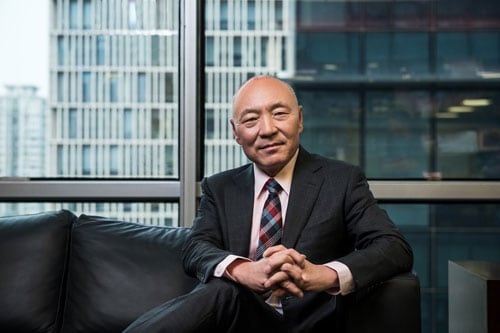BeiGene is one of a new wave of Chinese biopharma companies to list on the Hong Kong stock exchange, raising a huge $903m when it went public in August.
However while there are doubts about the robustness of some of the ‘pre-revenue’ biotechs now raising money or planning to raise money through Hong Kong IPOs, BeiGene looks like a potential contender for the future – not just in China, but globally.
It is among a handful of well financed, well organised companies captained by experienced pharma leaders which are now emerging from China – another example being Hong Kong-headquartered Chi-Med, which has just achieved a landmark approval in China for its own ‘home-grown’ cancer medicine. BeiGene was founded in Beijing (hence its punning name) in 2010 by CEO John Oyler and Xiaodong Wang, PhD, chairman of the scientific advisory board, with an executive team made up of Chinese and international executives.
It launched an IPO in the US two years ago, but now its public offering in China has helped swell its coffers enormously – which will help fuel its big ambitions.
The company has a PD-1 cancer immunotherapy, tislelizumab, in development in China, and believes it can compete in the market alongside multinationals MSD (Merck in the US) and BMS and their blockbuster checkpoint inhibitors Keytruda and Opdivo.
Meanwhile, BeiGene entered into a strategic global collaboration with Celgene in 2017, gaining the rights to Celgene’s Abraxane Revlimid and Vidaza in China, while Celgene gained an option to market the PD-1 prospect tislelizumab in global markets outside China.
The firm also has what it hopes is a best- in-class BTK inhibitor, zanubrutinib, in phase III trials, which it believes can be shown superior to Janssen’s Imbruvica.
Put all this together with its own R&D and commercial organisations with a total headcount of 1,100 people worldwide, and the company looks as though it could indeed be a force to be reckoned with.

John Oyler
“In terms of the industry as a whole… our aspirations are to be a global oncology leader – full stop,” John Oyler told the Goldman Sachs health conference in June.
On the commercial side, the company has appointed Dr Xiaobin Wu as its General Manager of China and President of BeiGene – a move which Oyler and others see as a major coup for the up-and-coming firm.
One of the best known pharma leaders in China, Dr Wu’s most recent achievement was to build Pfizer into one of the top multinational firms in China.
The mix of the Celgene products plus its own pipeline oncology products makes the company confident it can become a leader in China first, and then expand into the rest of the world.
The company has also invested in its R&D operations in Beijing, which Oyler says is pioneering in fusing together Chinese researchers and non-Chinese scientists in the country.
“We have built a very unique and capable clinical organisation, with over 450 people, which is one of the few organisations that is a mix of global and China from a team perspective,” says Oyler.
PD-1 contender filed in China
The company has just announced that it has filed tislelizumab with China’s National Medical Products Administration of China (NMPA, formerly known as CFDA or CDA).
The company is filing first for patients with relapsed/refractory classical Hodgkin’s lymphoma (R/R cHL) – a niche indication not yet taken in China by Keytruda and Opdivo, which both gained their first approvals there this year.
BeiGene’s drug is potentially differentiated from other PD-1s because of the antibody’s engineered Fc region, which preclinical data suggests could minimise potentially negative interactions with other immune cells.
Tislelizumab is in global phase III trials in a number of tumour types, including non-small cell lung cancer, hepatocellular carcinoma and oesophageal squamous cell carcinoma. It’s also in phase II trials in patients with previously treated hepatocellular carcinoma or with R/R mature T- and NK-cell lymphomas, and a further pivotal phase II trial in China in urothelial cancer.
Meticulous planning required for a successful launch

Bringing a PD-1 to market in China is a very different proposition to the US, both in terms of an immature regulatory pathway, and also the price which the market will accept. There are three other China-based firms that have already filed their own PD-1s in the country, but Oyler says these face a major bottleneck in terms of making sure their manufacturing process is robust enough to gain approval. BeiGene says it as headed off any such concens by working with well-established pharma company and contract manufacturer Boehringer Ingelheim to manufacture its drug.
Nevertheless, Oyler observes that the sheer size of China means that there will be room for a number of leading oncology specialists, either multinationals or Chinese firms.
“In reality, China needs all players – because when you think about trying to supply 2.5 million patients [eligible for PD-1 therapy in China] – we can’t do that as an organisation, even with a $350m manufacturing facility.”
Meanwhile, BeiGene is also looking to break into the still all-important US market.
Its BTK inhibitor zanubrutinib was granted Fast Track designation by the US FDA in July for the treatment of patients with Waldenström macroglobulinaemia (WM), based on phase 1 data.
BeiGene is preparing to submit in the first half of 2019 a New Drug Application (NDA) to pursue an accelerated approval of zanubrutinib for WM patients. It is awaiting more mature data in the autumn before making the final decision to file in the US.
Further down the line, Oyler also suggests the drug could emerge as the winner in a current phase III head-to-head trial with J&J’s Imbruvica in WM patients. If the company manages to achieve this, it will be another milestone in the development of a mature, innovation-based Chinese pharma sector.




